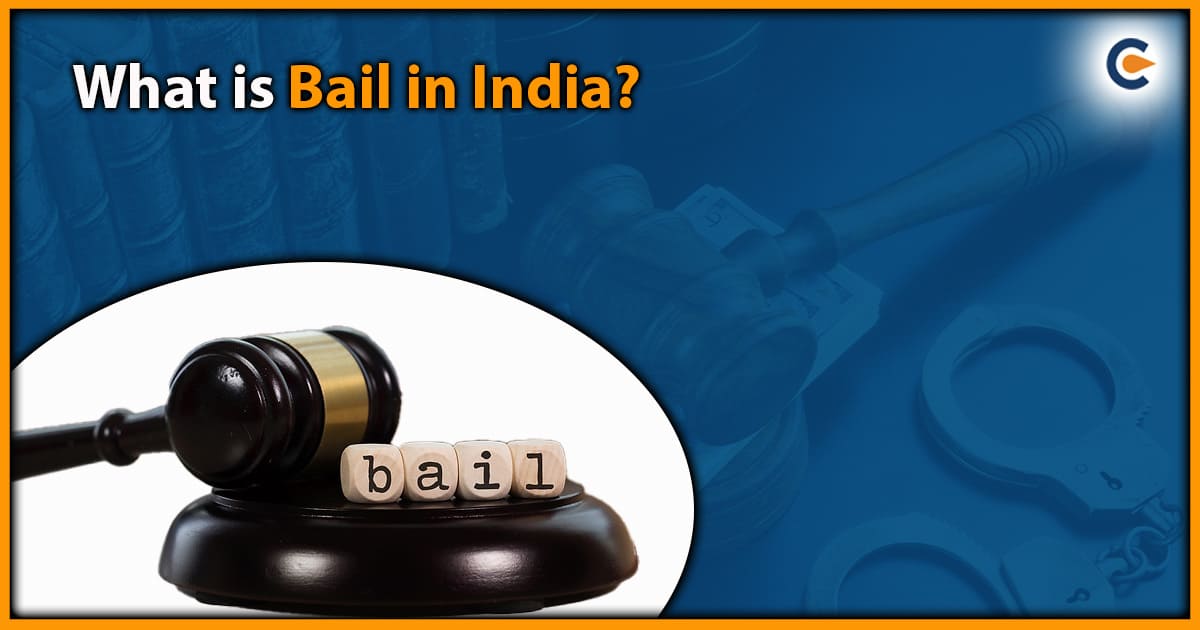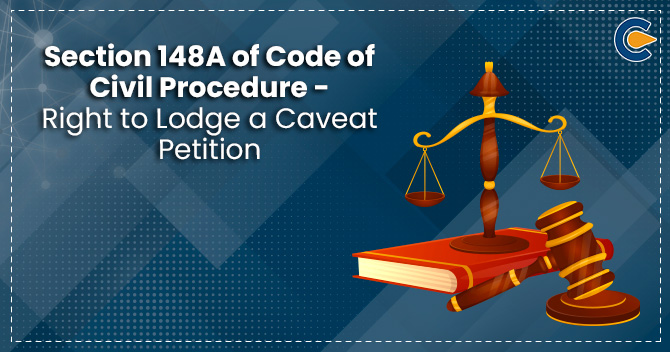When a person is accused of a crime and arrested by the police, one of the legal remedies available to them is to seek bail. Bail is a legal term used to describe the release of an accused person from custody, subject to certain conditions. In India, the provision of bail is a fundamental right enshrined in the Constitution of India, and it is important for all citizens to understand its legal provision. In this blog, we will explore the concept of bail in India and the legal provisions regarding it.
What Is Bail?
Bail is a legal arrangement where a person who has been arrested or detained for a crime is released from custody before their trial, subject to certain conditions. Bail is typically granted in exchange for a sum of money or other assets that the accused person provides as a guarantee that they will appear in court for their trial. The main motive of bail is to assure that the accused person attends their court hearings and does not flee or commit further crimes while awaiting trial. Bail is not a form of retribution, but rather a way to balance the interests of justice with the right of the accused to freedom before trial.
If the detained person fails to appear in court or violates the conditions of their bail, they may forfeit the money or assets that they provided as a guarantee and may be subject to re-arrest. Bail can also be revoked if new information comes to light that suggests the accused is a flight risk to the community.
Legal Provision Regarding Bail in India
The Code of Criminal Procedure, 1973 (CrPC), is primarily responsible for regulating the bail provision in India. According to the CrPC[1], a person who is arrested or detained for an offense has the right to apply for bail.
There are two types of bail in India: regular bail and anticipatory bail.
- Regular bail: It is granted to a person who is already in custody or has been arrested. The accused can apply for regular bail at any stage of the trial, but the grant of bail is under the control of the court. The court may consider as various factors, such as the solemnity of the offense, the evidence against the accused, and the possibility of the accused fleeing from justice, before granting bail.
- Anticipatory bail: Anticipatory bail is a pre-arrest bail provision that allows a person to seek bail in anticipation of their arrest. Anticipatory bail is usually sought in cases where the accused anticipates their arrest due to a complaint or FIR filed against them. The accused must provide grounds for why they need anticipatory bail, and the court may grant bail subject to certain conditions.
In addition to the CrPC, bail provisions are also provided under various other laws such as the Indian Penal Code, Narcotic Drugs and Psychotropic Substances Act, Prevention of Money Laundering Act, and Prevention of Terrorism Act. However, the basic principles governing bail remain the same across these laws.
The Code of Criminal Procedure provides the following provisions regarding bail:
- Bail is a legal right – Under Section 436 of the Code of Criminal Procedure, 1973, a person who is arrested for a bailable offense has the right to be released on bail. This means that if the offense is bailable, the accused has a right to be released on bail by the police or the court.
- Bail in non-bailable offenses – For non-bailable offenses, the accused can apply for bail under Section 437 of the Code of Criminal Procedure, 1973. However, the granting of bail in non-bailable offenses is at the discretion of the court.
- Bail conditions – The court can impose certain conditions while granting bail, such as the requirement to furnish a surety, a personal bond, or to attend all court proceedings. The court may also require the accused to deposit their passport or to not leave the country.
- Bail cancellation – The court may cancel bail if the accused violates any of the bail conditions, or if the court finds that the accused poses a threat to society or the witnesses.
- Anticipatory bail – Under Section 438 of the Code of Criminal Procedure, 1973, a person can seek anticipatory bail before arrest, in case they fear arrest in a non-bailable offense.
- Bail in special circumstances – The High Court or the Sessions Court may grant bail in special circumstances, such as if the accused is a woman, a child, a senior citizen, or a person with a disability.
It is important to note that the grant of bail is subject to the facts and circumstances of each case, and the discretion of the court. It is important to note that bail is not an absolute right, and the grant of bail is subject to certain conditions. The court may impose conditions such as requiring the accused to surrender their passport, to report regularly to a police station, or to provide sureties to guarantee their appearance in court. The accused is also required to furnish a bail bond, which is a written undertaking to comply with the conditions of bail, failing which the bail amount may be forfeited.
Furthermore, there are certain offenses for which bail may not be granted, such as offenses punishable by death or life imprisonment, or offenses under certain special laws such as the Prevention of Corruption Act.
In recent times, the Indian judiciary has also recognized the importance of granting bail to accused persons in a timely manner, particularly in light of the Covid-19 pandemic and the overcrowding of jails. The Supreme Court has emphasized that bail should be granted liberally, and that courts should adopt a more nuanced approach to the grant of bail, taking into account the individual circumstances of each case.
Factors Considered by The Court While Granting Bail
The court considers various factors while granting bail to an accused person. Some of the factors that are considered include:
- Nature and gravity of the offense: The court considers the seriousness of the offense and the punishment that may be imposed if the accused is convicted. Generally, more serious offenses are less likely to result in the grant of bail.
- Strength of the evidence: The court considers the strength of the evidence against the accused, including whether there is a prima facie case against the detained or not.
- Criminal history: The court may assess the accused’s criminal history, including any prior convictions, while deciding whether to grant bail.
- Flight risk: The court considers whether the accused is likely to abscond or flee from justice if granted bail.
- Possibility of interfering with witnesses or tampering with evidence: The court considers whether there is a possibility that the accused may interfere with witnesses or tamper with evidence if released on bail.
- Medical condition: The court may consider the medical condition of the accused, particularly if they require urgent medical attention.
- Cooperation with the investigation: The court may consider whether the defendant has cooperated with the investigation or not.
- Public interest: The court may consider the interests of justice and the public interest in deciding whether to grant bail.
- Antecedents of the accused: The court may take into account the accused’s past conduct, antecedents, and reputation while deciding whether to grant bail.
- Length of detention: If the accused has been in custody for a prolonged time, the court may consider this factor while deciding whether to grant bail.
- Age and health of the accused: The court may consider the age and health of the accused, particularly if they are elderly or have health issues that make it bit difficult for them to stay in custody.
- Likelihood of conviction: The court may consider the likelihood of the accused being convicted and sentenced to imprisonment while deciding whether to grant bail.
It’s important to note that the court’s verdict to grant bail is based on a balance between the interests of justice and the right to personal liberty. The court may impose conditions on the grant of bail to ensure that the accused attends court hearings and does not interfere with the investigation. If the accused violates the conditions of bail, the bail may be revoked, and the accused may be re-arrested.
Bail Application Process
The process of applying for bail in India involves the following steps:
- Filing of Bail Application: The accused or their lawyer files a bail application in the court that has jurisdiction over the case. The application should contain details of the offense, the reasons for seeking bail, and any other relevant information.
- Notice to Public Prosecutor: The court issues a notice to the public prosecutor or the state, giving them an opportunity to oppose the grant of bail. The public prosecutor may file a reply to the bail application, setting out their objections to the grant of bail.
- Bail Hearing: The court conducts a bail hearing, where both the accused and the public prosecutor have the opportunity to present their arguments. The court may also consider any documents or evidence submitted by the parties.
- Decision on Bail: Based on the arguments and evidence presented, the court may either grant bail or reject the bail application. If bail is granted, the accused is required to furnish a bail bond and comply with any conditions imposed by the court.
It is important to note that the bail application process may vary depending on the specific court and the nature of the offense. For example, in cases where the offense is punishable by death or life imprisonment, the bail application may be heard by a higher court. Similarly, in cases where the accused is seeking anticipatory bail, the process may involve additional steps, such as a notice to the police and a hearing before the court.
Overall, the process of applying for bail in India is a crucial step in protecting the rights of the accused and ensuring that they are not subjected to undue hardship while awaiting trial. It is important to note that the process of applying for bail in India can be complex, and it is advisable to seek the assistance of a lawyer who is experienced in criminal law. A lawyer can help the accused understand the legal provisions relating to bail, draft a strong bail application, and present compelling arguments before the court.
If the bail application is rejected by the lower court, the accused may also have the option of appealing to a higher court, such as the High Court or the Supreme Court. The higher court may review the lower court’s decision and may grant bail if it is satisfied that the lower court erred in its decision. In some cases, the accused may also seek anticipatory bail, which is a pre-arrest bail that is granted to a person who apprehends arrest in a non-bailable offense. In such cases, the accused may file an application for anticipatory bail before the court, stating the reasons why they believe that they may be arrested. The court may grant anticipatory bail if it is satisfied that the accused has a reasonable apprehension of arrest, and that they are not likely to abscond or interfere with the investigation.
Overall, the process of applying for bail in India is an important safeguard for the rights of the accused and is an integral part of the criminal justice system. The grant of bail allows the accused to defend themselves in court, while also ensuring that they are not subjected to undue hardship while awaiting trial.
The Landmark Case Of “BAIL”GURBAKSH SINGH SIBBIA V. STATE OF PUNJAB1980 AIR 1632
Gurubaksh Singh Sibia v. State of Punjab is a landmark case in Indian criminal law that deals with the concept of “Anticipatory bail“. The case was a decision is provided by the Supreme Court of India in 1980 and clarified the law on anticipatory bail in India.
Facts Of the Case:
Gurubaksh Singh Sibia was a social worker and a member of the Punjab Legislative Assembly. In 1978, he was arrested and detained by the Punjab Police in connection with a criminal case under the Terrorist Affected Areas (Special Courts) Act, of 1975. He was released on bail after spending about a year in jail.
Subsequently, in 1979, he apprehended that he might be arrested again in connection with the same case. He, therefore, filed an application for anticipatory bail under Section 438 of the Criminal Procedure Code (Cr.P.C.) before the Punjab and Haryana High Court. The High Court, however, dismissed his application on the ground that Section 438 did not apply to cases arising out of the Terrorist Affected Areas (Special Courts) Act, 1975.
Sibia then approached the Supreme Court of India challenging the High Court’s order.
Legal Issues: The primary legal issue before the Supreme Court, in this case, was whether the provisions of Section 438 of the Cr.P.C. applied to cases arising out of the Terrorist Affected Areas (Special Courts) Act, 1975. The other issue was the interpretation and scope of Section-438 of Cr.P.C.
Judgment: The Supreme Court held that the provisions of Section 438 of Cr.P.C. applied to cases arising out of the Terrorist Affected Areas (Special Courts) Act, 1975. The court further holds the power to grant anticipatory bail was an extraordinary power and should be exercised with care and caution.
The court also holds that the power to grant anticipatory bail was discretionary, and the authorities had to exercise this power objectively. The court have observed that the power to grant anticipatory bail was open to correction by higher courts.
The court held that anticipatory bail was not an absolute right, and it shouldn’t be granted as a matter of routine. The court emphasized that the applicant must show that he has a reasonable apprehension of arrest in a non-bailable offence and that he would be denied bail if arrested.
The court also clarified that anticipatory bail could be granted subject to appropriate conditions, such as cooperating with the investigation, not leaving the country without the court’s permission, and surrendering to the police if required.
Significance:
The Gurubaksh Singh Sibia case is significant as it clarified the law on anticipatory bail in India. The case laid down the principles governing the grant of anticipatory bail and emphasized that this power should be exercised with care and caution. The case has since become a landmark in Indian jurisprudence, and the principles laid down, in this case, have been applied in subsequent cases involving anticipatory bail.
The Supreme Court in this case also said that the interpretation of Section 438 of the Cr.P.C. did not arise in the case and that the case was major concerned with Rule 184 of the Defence and Internal Security of India Rules, 1971, and Section 438 applied in such a situation.
The Court observed that the language of Section 438 of the Cr.P.C. was wide enough to include any offence, including those arising out of special Acts. The Court noted that the language used in Section 438 was “offence,” which was a term of general import and included all offences, including those under special Acts.
The Court also observed that the special Acts provided for specific provisions for bail and that the provisions of such Acts would not affect the power of the Court to grant anticipatory bail under Section- 438 of the Cr.P.C.
The Court emphasized that the power to grant anticipatory bail was a discretionary power and that the authorities had to exercise this power judiciously. The Court held that the grant of anticipatory bail should be subject to appropriate conditions to ensure that the applicant cooperates with the investigation and does not misuse the liberty granted to him.
The Gurubaksh Singh Sibia case clarified the law on anticipatory bail in India and laid down the principles governing the grant of anticipatory bail. The case emphasized that the power to grant anticipatory bail was an extraordinary power and should be exercised with care and caution. The principles laid down in this case have been followed in subsequent cases involving anticipatory bail, and the case has become a landmark in Indian jurisprudence. The case reaffirmed the importance of the judiciary in protecting the rights of citizens.
Conclusion
In conclusion, bail is a legal provision that allows an accused person to be released from custody while awaiting trial. In India, the right to bail is guaranteed by the Constitution, subject to certain conditions. When considering a bail application, the court takes into account various factors, such as the gravity of the offense, the likelihood of the accused absconding, and the antecedents of the accused. The process of applying for bail in India can be complicated, and it’s important to seek the assistance of an experienced lawyer. Overall, the grant of bail is an important safeguard for the rights of the accused and ensures that they are not subjected to undue hardship while awaiting trial.
Read our Article:Detailed Guidelines For Arrest And Bail Under GST











